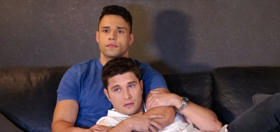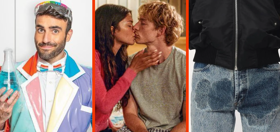 The state of Coahuila in Mexico recently legalized same-sex marriage, becoming the first of the country’s 31 states to do so through the legislative process. But the fight for equality for gay people living in south of the border is far from over.
The state of Coahuila in Mexico recently legalized same-sex marriage, becoming the first of the country’s 31 states to do so through the legislative process. But the fight for equality for gay people living in south of the border is far from over.
“The police here are very coercive and manipulative,” says 36-year-old Cesar Salazar (pictured). “They are not on our side. They see gay people as targets.”
Salazar is a professional actor and musician. He lives with his family in Mexico City, where he was born and raised. In an exclusive interview with Queerty, he spoke about his experiences living in a country where being gay is still often considered taboo and where homophobia and police extortion are constant threats in the everyday lives of gays and lesbians.
In general, what is the attitude towards gay people in Mexico, specifically in Mexico City, where you live?
How about we take this to the next level?
Our newsletter is like a refreshing cocktail (or mocktail) of LGBTQ+ entertainment and pop culture, served up with a side of eye-candy.
In general, it’s still very difficult here. It’s politically correct to say that you favor gay rights and accept gay people, but the actual act of doing so doesn’t happen. For a lot of gay men, it’s very hard for them to express themselves openly.
It’s a little different for me, personally, because I’m what people in Mexico would call a “chacal.” I tend to have more masculine mannerisms. I have a beard. So people don’t suspect I’m gay. When they find out, they’re often surprised.
And when they do find out, do they ever harass you?
Yes. I was in Guadalajara with a friend one time. We were crossing the street when some guys passing in a car rolled down the window and called us “putos” (faggots). I yelled back at them. They got out of the vehicle, intending to fight us. I told them to take it easy, that we didn’t want any problems, and that’d we’d just get out of there. Next, one of the guys started kicking my friend. I had to break it up. Afterwards, my friend was upset with me. He thought I had provoked the guys by yelling back at them. But they had started it. I was just sticking up for the two of us.
 Couldn’t you go to the police for help?
Couldn’t you go to the police for help?
The police here are very coercive and manipulative. They are not on our side. They see gay people as targets. For instance, there are many locations within Mexico City where gay people are known to get together — parks, forests, public places, etc. — to hang out and have sexual encounters. Police are aware of this and will often go there just to harass them.
There’s a park close to where I live. It’s very beautiful. There’s a water reserve and a lot of trees and wildlife. One night, I rode my bike there. Another guy noticed me. So we started chatting. That’s all we were doing at that point. Just chatting. All of a sudden a policeman shined his flashlight on us. “I see what you’re doing,” he said. And I replied: “What are you talking about? We’re not doing anything. We’re just talking.”
He called for backup, then he took my bicycle and said we would have to go with him to the station. I knew we hadn’t done anything wrong, and that he couldn’t make us go with him, so I looked at the other guy and I told him he could either leave or stay with the cop. He was very scared and chose to stay. I left.
What about your bike?
I never got it back. It was easier to surrender it than deal with going down to the station.
What would have happened if you had gone down to the station?
They cops probably would have extorted me. A lot of gay men will just pay an officer on the spot rather than be taken to the station. It’s easier. You give them all the cash in your wallet and they let you go.
 With so much scrutiny, are there any safe places where gay men can go to meet?
With so much scrutiny, are there any safe places where gay men can go to meet?
The “Zona Rosa” (Pink Zone) is Mexico City’s gay neighborhood. It’s the one spot where it’s okay for two men to hold hands or kiss. There are a lot of bars and shops there. It’s very nice.
Throughout the city, there are also more discreet gay sex clubs. You usually pay about $100 pesos ($7.50 U.S.) entry. There’s a bar and an area for socializing, plus several individual rooms. One of the most popular clubs is called “La Casita” (The Little House).
It’s very common for closeted men — especially older men — to be married with a family and have a gay sex life on the side. Because of family, religion, tradition, their jobs, and other various reasons, they can’t be sexually liberated. So they express their sexuality in secret. There is this ongoing bisexuality. And it often happens in places like La Casita.
Do you see a hopeful future for gay people in Mexico?
For younger generations under 30, they have no problem with being gay and expressing themselves. They’re much more free. What they are experiencing right now is a sexual liberation that is very, very grand.
I’m optimistic, but I also believe that much of what happens next depends on our leaders. They must use their influence to change things. Kind of like what’s happened in Coahuila — with gay marriage being made legal — only on an even larger scale. That will lead to a better future where gay Mexicans are able to express themselves openly and in a free way.
Related stories:
Here’s What Goes On Inside The All-Male “Akharas” Of India



















Mikah
I’d love to visit Mexico city’s Gayberhood.
Black Pegasus
Meanwhile, gay men in parts of Africa are being brutalized, sent to prison, and even killed for being gay. If the Mexican police only took away your bicycle, consider yourself lucky.
Btw, the photo of this guy sitting with his legs crossed isn’t the image you want to project if you’re looking for empathy. (Least not from me) Just saying.
onthemark
I was curious enough to look in the atlas for where Coahuila state is. It’s in the last place I expected – in the far north next to Texas! Looks to be very rural too. I wonder why they were the first state to go for s/s marriage.
machine_teen
@Black Pegasus:
Where in this article was there anything about Uganda? Was he comparing his suffering to that of gays in Uganda? No, so why are you? Does what’s going on in Uganda make his ordeals any less real or important? No, it doesn’t.
How completely rude and ignorant of you. And then you go on to say that if he wants sympathy he should act more like a man. You really don’t get what it means to be gay and suffer for being gay. You clearly see being gay the way people who hate us do, and you’re no different than them, either.
You’re really a piece of shit, if you didn’t know that before, here’s your notice.
Paco
@Black Pegasus: how does one crossing their legs when they sit determine your empathy for them? That was a really strange statement to make.
Saint Law
@Black Pegasus: I love that you say he should count himself lucky the cop only harassed and then mugged him, rather than took him to the police station where anything could have happened to him.
Do you feel grateful for being permitted to sit on your soft arse and bang your trotters on your key-board to no productive end whatsoever? Because you really really should.
stadacona
Gay Mexicans have nation-wide equal rights – far ahead of the USA, and the young gays are open. This article sounds like a bitter old gay man complaining.
machine_teen
@stadacona:
You’re not too in tune with the state of affairs in Mexico are you? Parts of Mexico are some of the most dangerous places on earth and a lot of that is due to the police. It’s very corrupt, so what do laws really mean when the people enforcing them are only out for themselves. That was stated pretty clearly in the article.
sfcarlos65
Mexicans are some of the biggest bullies around, if it isn’t straight Mexicans offended that we’re not following cultural norms, it’s self-hating, gay Mexicans that have allowed their less educated elders to bully them around.
Alberto
I would tend to disagree with Cesar. I’ve been living in Mexico City for the past 2 years and a half and consider Mexico City as one of the most liberal cities in the world. Albeit I have never lived in New York, I went to boarding shcool in Chicago, college in Boston and Philadelphia, and a year abroad in Paris. I believe all of these places were more conservative than D.F. When my company had its global LGBT conference, Mexico had one of the highest lgbt/staff ratio. I am 25 and my boyfriend is 19, and we are open to our families, co-workers and friends. True, Zona Rosa is the gayborhood, but I never go there. Envy, Guilt, and Ken are a few of the gay clubs located in Mexico’s trendiest neighborhoods, Polanco and Condesa. I feel safe holding hands and kissing my boyfriend when having dinner or getting groceries. I would agree that the situation outside D.F. (provincia) is another story, but in Mexico City I feel I have the same rights as any other citizen.
Rusty Alcorta
@Alberto: Thank you, I wanted to add that I visit my friends in Mexico City at least one week a year and I have been all over Mexico since the sixties and even then as a gay boy and then a gay man, I never had any problems. When I go to Mexico City I always have a blast and I agree it is a very liberal city, more so than a lot of European cities especially those in Italy although a lot of my friends who are close in Italy hug and kiss, they have to stay closeted where my friends in Mexico City do not. Some of my friends in Mexico City are transvestites by night but during the day they still look very feminine to me and we’ve never had a problem. Also Guadalajara has been a liberal city since the seventies. Read “De Los Otros” by Dr. Joseph Carrier. What happened to Cesar happens in America too. And there are many very dangerous places in America too and I have never felt that we are as liberal as Mexico. Thanks again Alberto. Point well made.
brandonbernier21d
I was raised in Mexico, it wasnt until recently that I moved to the States, I’ve been out of the closet since I was about 14 yrs old (Im 18). To this day I have yet to meet another teen who genuinely has a problem with it. Whereas I hear that adults have more of a problem with it. The younger people are usually very welcoming and accepting (with the luck that Ive had). There are some parts of Mexico where Im sure its tabboo. But I lived in Mexico City and never did I have to worry about being out and proud. But again thats me. I wish people could hear more about the gay teens in Mexico, its actually pretty interested how loved we can be there.
vive
@Black Pegasus, what the hell is wrong with crossing your legs like that? It’s how Roger Moore sat in the James Bond movies, so it’s not a gay mannerism as such, but even if it were, what the hell is wrong with you?
Michael93
@sfcarlos65: wow so true from my moms side every time we go visit family over in Mexico so much bullying I hated going glad we don’t visit anymore